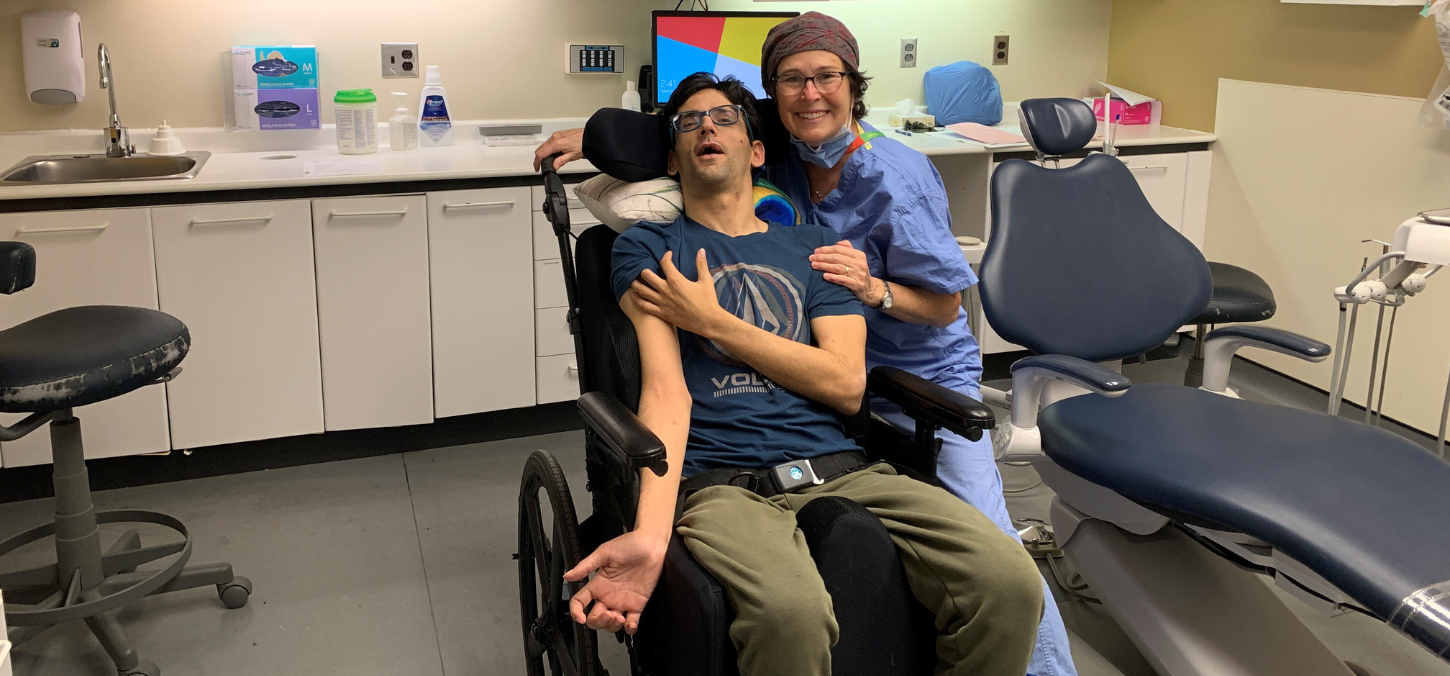
Special needs care requires special education
Alumni working with these patients hope for more training
By Diane Peters
Recently, Mary-Ellen Cascone 8T9 saw one of her long-time patients, a nonverbal woman with autism. Working with the patient’s mother, they got her into the treatment room by pulling her along the floor, gently, while she sat on her bum.
“I kept her on the floor. I got four teeth cleaned,” says Cascone, division head of the Dental Program for Persons with Special Needs at Mount Sinai Hospital, as well as an instructor at the Faculty. The mother was incredibly thankful.
That’s what treating patients with special needs can look like.
“People think I have a magic wand. I clearly don’t. I will get on my hands and knees.”
But what Cascone and her colleagues, many of whom are alumni and still teach at the Faculty, do have, is experience with this population of patients who are drastically underserviced. They know how to be creative, flexible and patient when caring for patients with neurological and physical needs that can make offering them dentistry difficult.
They often improvise to offer compassionate care that meets the person and their family where they are.
Literally: sometimes the appointment starts in the car, with the most terrified patients getting sedated in the parking lot.
Cascone and her team do everything they can to offer cleanings — even getting the parent to do a thorough teeth brushing with their guidance — and do routine procedures in treatment rooms. They see most patients every four months to keep their dental health on track, and once someone is part of the special needs program, they often remain in it for life.
But for many, this level of care not enough. They’re so frightened, or aggressive, or have such profound spasms, or they need treatment for an abscess or other serious issue, that they need to go under general anaesthetic in a Mount Sinai operation room.
For this, there’s a two-year-plus wait, the longest for any procedure at the hospital. (New patients also wait a year to get a consult to join the program, as it’s so busy.)
“These are patients that cannot be treated unless they are put to sleep. It’s challenging because they’re often fragile medically, so it can be dangerous to put them to sleep. But that’s what we have to do,” says Michael Goldberg 9T1, 9T4 Dip/MSc Perio, dentist-in-chief and head of periodontics at Sinai Health.
There are no other places in Ontario that treat the patients we have
“There are no other places in Ontario that treat the most challenging cases we have,” says Goldberg, who is also an associate professor, teaching stream at the Faculty. While children and teens with special needs have good access to dental care, it all ends once someone turns 18. Adults lack a robust system of care for dentistry, and their other needs, too. These patients are living longer than ever, which is a good thing, but that puts more demands on the system, and the system isn’t ready.
Goldberg works hard to advocate for dentistry at the hospital and to try to secure more OR time. That barrier, as well as challenges in finding enough dentists to treat this group, holds the hospital back from getting the wait list down.
There are too few dentists in the community who have the training to be comfortable treating special needs patients. So many from this population end up with a referral to Sinai.
Cascone says some patients with Down Syndrome, for instance, could get treated closer to home. However, the dentist may have to set aside a little more time, be extra patient, and deal with a reduced fee through the Ontario Disability Support Program.
“Keep them in your office,” she says. “Working with these patients can be very rewarding, and would improve access to care.”
To increase the number of dentists with the skills to serve this growing population, the team at Sinai and the Faculty of Dentistry hope to launch a fellowship unlike any other in the country.
This one-year program would train a dentist in special needs dentistry who could then go on to join the Sinai team, launch a program at their own local hospital, or add this type of care to their private practice.
While general practice residency and DDS3 and 4 students rotate through the special needs clinic and in doing so pick up some strong, basic skills, a fellow would gain much more substantial training and experience.
Over time, such a fellowship could make a meaningful difference to the dental care of this population in the province.
“It’s not for everyone,” admits Cascone, as it’s mentally and physically demanding work and the compensation can be a bit challenging. But she’s hopeful a fellowship will help others like herself, and her Sinai colleagues become proficient in work they know makes difference.
“It’s all I’ve ever done,” she says. “And I love it.”
Top photo: Mary-Ellen Cascone and her patient (courtesy of Mary-Ellen Cascone)